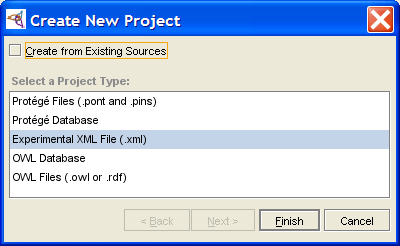Difference between revisions of "PrF UG files xml support"
| Line 12: | Line 12: | ||
and then selecting <b>Experimental XML File</b> in the <b>Create New Project</b> dialog: | and then selecting <b>Experimental XML File</b> in the <b>Create New Project</b> dialog: | ||
| − | <div>[[Image:PrF_UG_files_xml_create.png| | + | <div>[[Image:PrF_UG_files_xml_create.png|frame|none| |
| + | Create New Project]]</div> | ||
You can also [[PrF_UG_projects_convert_project|convert]] an existing project to XML | You can also [[PrF_UG_projects_convert_project|convert]] an existing project to XML | ||
| Line 54: | Line 55: | ||
For example, it does not turn classes in {{#var:PrF}} into XML Schema complex types. | For example, it does not turn classes in {{#var:PrF}} into XML Schema complex types. | ||
An export mechanism that does this may eventually be developed separately. | An export mechanism that does this may eventually be developed separately. | ||
| + | |||
</div> | </div> | ||
Revision as of 12:14, October 21, 2008
Experimental XML Format
Currently, the XML backend for Protege-Frames is still under development. The intent is to eventually make this the default backend for Protege-Frames, once it has become stable and supports the full feature set.
You can create a new XML project by selecting File | Create Project and then selecting Experimental XML File in the Create New Project dialog:
You can also convert an existing project to XML by selecting File | Convert Project and then selecting Experimental XML File in the Convert Project dialog box.
Note: The XML backend uses its own Schema and will not let you import an arbitrary XML file into Protege.
The first time you save an XML project, Protege creates the following files:
a .pprj file, which contains Protege-specific UI information
a .xml file, which contains XML-encoded ontology information for the knowledge base\
Protege-Frames uses a single XML Schema file that is optimized to work with the Protege model. All information in the knowledge base is treated as "instances". The format of these instances, described in the Schema file, is designed to be simple, readable, and easily processible by XSLT in straightforward ways. The Schema is available at:
http://protege.stanford.edu/xml/schema/protege.xsd
Feedback on the Schema is strongly solicited. The schema should not be considered fixed at this point and users should not rely on this backend functioning correctly or upon the schema remaining fixed from build to build. We do encourage you to try it out and report any problems that you see.
Note: This backend cannot be used to generate XML Schema files. For example, it does not turn classes in Protege-Frames into XML Schema complex types. An export mechanism that does this may eventually be developed separately.
